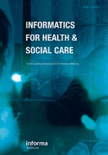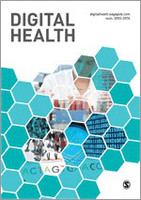
Interactive Journal of Medical Research
Scope & Guideline
Championing accessible knowledge for global health advancements.
Introduction
Aims and Scopes
- Digital Health and Telemedicine:
The journal consistently publishes research on digital health technologies, including telemedicine, mobile health applications, and remote monitoring, highlighting their impact on patient care and health equity. - Machine Learning and Data Analytics:
A key focus is on the application of machine learning and data analytics in healthcare, exploring predictive modeling, decision support systems, and the use of big data to enhance medical research and practice. - Public Health and Pandemic Response:
The journal addresses public health challenges, particularly in the context of pandemics like COVID-19, discussing strategies for resilience, health system preparedness, and the social determinants of health. - Behavioral Health and Mental Health Innovations:
Research on mental health interventions, including the use of digital tools and community-based approaches, is a significant area of interest, reflecting the journal's commitment to addressing mental health crises. - Patient Empowerment and Health Literacy:
The journal emphasizes the importance of patient empowerment through education and health literacy, exploring how technology can facilitate informed decision-making among patients.
Trending and Emerging
- AI and Predictive Analytics in Healthcare:
There is a notable increase in studies focusing on artificial intelligence and predictive analytics, exploring their applications in diagnostics, treatment planning, and personalized medicine. - Telehealth and Health Equity:
Research addressing the digital divide and promoting telehealth equity has gained traction, reflecting a growing recognition of the need for equitable access to healthcare services, especially post-COVID-19. - Mental Health Innovations Through Technology:
Emerging themes include the use of technology to support mental health, such as mobile apps and online therapy, which are increasingly recognized as vital components of comprehensive mental health care. - Health Data Security and Ethics:
As digital health expands, there is a rising focus on the ethical implications and security of health data, emphasizing the importance of protecting patient information in digital environments. - Community and Patient-Centered Care Initiatives:
Research emphasizing community engagement and patient-centered approaches in healthcare delivery is trending, highlighting the importance of addressing the needs and preferences of diverse patient populations.
Declining or Waning
- Traditional Clinical Trials:
There seems to be a waning interest in traditional randomized controlled trials, as the focus shifts towards innovative methodologies such as real-world evidence and observational studies, which are more adaptable to contemporary healthcare challenges. - Invasive Medical Procedures:
Research on invasive medical procedures is less prominent, possibly due to a growing emphasis on non-invasive or minimally invasive alternatives and a preference for digital or telehealth solutions. - Generalized Health Policy Analysis:
Publications focusing solely on broad health policy discussions are decreasing, as the journal increasingly prioritizes specific, evidence-based interventions and their practical applications in health systems. - Pharmacological Interventions:
Research centered on pharmacological treatments, particularly those not integrated with digital health tools or innovative methodologies, appears to be less frequent, indicating a potential shift towards holistic and integrated care approaches.
Similar Journals

INFORMATION RESEARCH-AN INTERNATIONAL ELECTRONIC JOURNAL
Advancing Knowledge in Library and Information Sciences.INFORMATION RESEARCH - AN INTERNATIONAL ELECTRONIC JOURNAL is a distinguished open-access journal published by the University of Sheffield's Department of Information Studies, situated in England. Since its inception in 1995, the journal has been at the forefront of disseminating research findings in the field of Library and Information Sciences, earning a commendable Q2 ranking in the category for 2023. With an ISSN of 1368-1613 and an E-ISSN of 1368-1613, it serves as a vital resource for scholars, practitioners, and students alike, providing a platform for innovative insights and engaging discussions. The journal accepts submissions from diverse perspectives related to the information research domain and contributes to the ongoing dialogue among academic professionals worldwide. With a Scopus ranking placing it at 150 out of 280 in its field, this publication underscores its importance in shaping the future of information studies while enabling wide accessibility to cutting-edge research.

Archivos de Medicina
Advancing Medical Knowledge for AllArchivos de Medicina is a prominent open-access journal published by the Universidad de Manizales, Facultad de Medicina, dedicated to advancing the field of medical sciences. With an ISSN of 1657-320X and an E-ISSN of 2339-3874, this journal has been a key resource for researchers and healthcare professionals since its inception in 2012, facilitating the broad dissemination of high-quality, peer-reviewed research. Its commitment to open access ensures that critical medical research is available to all, promoting collaboration and innovation across various disciplines. Archivos de Medicina aims to publish original articles, reviews, and case studies that contribute to the understanding and improvement of health systems, medical practice, and public health. By fostering an international dialogue among scholars and practitioners, the journal plays a vital role in shaping evidence-based medicine, making it an invaluable resource for anyone dedicated to advancing healthcare knowledge and practice.

GESUNDHEITSWESEN
Connecting Research and Practice in Health and MedicineGESUNDHEITSWESEN, published by GEORG THIEME VERLAG KG, is a leading journal in the fields of Medicine and Public Health, with an ISSN of 0941-3790 and an E-ISSN of 1439-4421. Since its inception in 1992, it has provided a vital platform for the dissemination of research and scholarly articles pertinent to various aspects of health sciences, reflecting the journal's commitment to advancing knowledge and practice in the medical domain. With its current ranking in the third quartile (Q3) in both Medicine (miscellaneous) and Public Health, the journal continues to thrive through a diverse array of contributions that support the interdisciplinary nature of health studies. Though not open access, the journal ensures that high-quality research is accessible to its audience through institutional and personal subscriptions. With a converging timeline leading to 2024, GESUNDHEITSWESEN remains an essential resource for researchers, healthcare professionals, and students seeking current insights into health-related issues and solutions.

JMIR Medical Informatics
Empowering Health Innovations with Data-Driven InsightsJMIR Medical Informatics is a leading open access journal dedicated to the field of medical informatics, published by JMIR Publications, Inc. since 2013 in Canada. With an impressive impact factor and a distinguished Q2 ranking in both Health Informatics and Health Information Management categories, this journal plays a pivotal role in disseminating cutting-edge research and innovative practices. Covering a wide scope that includes clinical informatics, health information systems, and data analytics, JMIR Medical Informatics provides valuable insights for researchers, practitioners, and policymakers alike. The journal is accessible to a global audience, ensuring that pioneering studies and methodologies reach those who can apply them to enhance health outcomes. With its commitment to advancing the body of knowledge in medical informatics, this journal stands as a vital resource for anyone involved in or studying the intersection of healthcare and technology.

Informatics for Health & Social Care
Advancing patient outcomes via health informatics.Informatics for Health & Social Care is a leading journal published by Taylor & Francis Inc, dedicated to the intersection of health informatics and social care. With a strong emphasis on advancing knowledge in the fields of health information management and nursing, this journal has established itself as a vital resource for researchers and professionals seeking to explore innovative applications of informatics to improve patient outcomes and streamline healthcare delivery. Recognized for its influential contributions, it currently holds a Q2 ranking in both Health Informatics and Health Information Management, as well as a prestigious Q1 ranking in Nursing (miscellaneous) for 2023, signifying its critical role within the academic community. The journal is accessible for open access viewing, fostering a broader dissemination of research findings. Released continuously since 1976, it stands as a testament to the evolving landscape of health informatics, addressing pertinent issues and facilitating discussions that shape practices in health and social care delivery.

mHealth
Pioneering Research in Mobile Health TechnologiesmHealth is a pivotal peer-reviewed journal published by AME PUBLISHING COMPANY, focusing on the evolving field of mobile health technologies and their impact on public health and health informatics. With an E-ISSN of 2306-9740, this journal, based in China, operates under an open access model, ensuring widespread dissemination and accessibility of published research. As of 2023, mHealth is recognized in the Q2 category for both Health Informatics and Public Health, Environmental and Occupational Health, reflecting its significant contribution to vital areas of contemporary health research. The journal's Scopus rankings further enhance its reputation, situating it in the 74th percentile for Public Health and 64th for Health Informatics, making it an essential resource for researchers, professionals, and students eager to explore the intersection of technology and health outcomes. Covering a diverse range of topics from 2019 through 2024, mHealth aims to foster innovation and knowledge exchange among practitioners and scholars alike.

Digital Health
Empowering Change in Health Technology and Policy.Digital Health is a pioneering open-access journal published by SAGE Publications Ltd, dedicated to advancing the field of health technology and its intersection with health policy, informatics, and the broader medical landscape. Since its inception in 2015, the journal has rapidly established itself as an essential resource for researchers, professionals, and students, serving as a platform for innovative research that leverages digital tools to improve health outcomes. Currently ranked in the Q2 category across four relevant domains, including Computer Science Applications and Health Informatics, it commands respect within the academic community. With its accessible framework, Digital Health facilitates the dissemination of critical findings and new methodologies that inform policy and practice. The journal’s commitment to open access promotes worldwide access and cooperation, making significant contributions to the evolving landscape of digital health.

Medisur-Revista de Ciencias Medicas de Cienfuegos
Elevating Medical Research from Cienfuegos to the WorldMedisur-Revista de Ciencias Medicas de Cienfuegos is a distinguished peer-reviewed journal dedicated to advancing the field of medical sciences. Published by the CENTRO PROVINCIAL INFORMACION CIENCIAS MEDICAS CINFUEGOS, this journal has been an open-access platform since 2003, fostering a spirit of collaboration and knowledge-sharing within the global medical community. With its commitment to providing high-quality research, Medisur covers a broad spectrum of topics relevant to healthcare professionals, researchers, and students. It aims to enhance medical practice and education in Cuba and beyond by disseminating crucial findings and innovative ideas. The journal's mission aligns with the increasing demand for accessible medical research, ensuring that vital information reaches those who need it most. Residing in the heart of Cienfuegos, Cuba, the journal plays a crucial role in promoting local research on a global scale while adhering to international academic standards.

Lancet Digital Health
Innovating Health Delivery for a Digital Tomorrow.Lancet Digital Health is an esteemed Open Access journal published by ELSEVIER, dedicated to advancing the interdisciplinary field of digital health. Since its inception in 2019, the journal has rapidly established itself as a leading platform for disseminating high-quality research focusing on the implications of digital technology in healthcare delivery, health informatics, and patient management. Renowned for its rigorous peer-review process and commitment to academic excellence, Lancet Digital Health currently holds prestigious Q1 rankings across multiple categories including Decision Sciences, Health Informatics, and Medicine (miscellaneous) as of 2023. With an impressive impact in its field—ranked #1 in Health Informatics and within the top percentile of related disciplines—this journal offers vital insights into the ongoing transformations within health systems globally. Researchers, healthcare professionals, and students alike will find a wealth of cutting-edge studies, practical applications, and discussions on the future of digital health, fostering an evidence-based dialogue that is essential in today's rapidly evolving medical landscape.

BMJ Health & Care Informatics
Transforming Health Care Through Innovative InformaticsBMJ Health & Care Informatics, published by the esteemed BMJ Publishing Group, stands at the forefront of the rapidly evolving field of health informatics. Established as an Open Access journal in 2019, it is dedicated to disseminating high-quality research that enhances the integration of health care with information technologies. With a prominent Q1 ranking in 2023 across categories such as Computer Science Applications, Health Informatics, and Health Information Management, this journal serves as an essential resource for researchers and practitioners alike. The journal is indexed in reputable databases and boasts impressive Scopus ranks—notably, it is placed #43 among Health Informatics journals. The aim is to foster innovation and understanding in health care practices through rigorous research and collaboration. Encompassing a wide spectrum of topics within health data science, usability, and outcomes research, BMJ Health & Care Informatics is pivotal for anyone involved in advancing health care through technology.